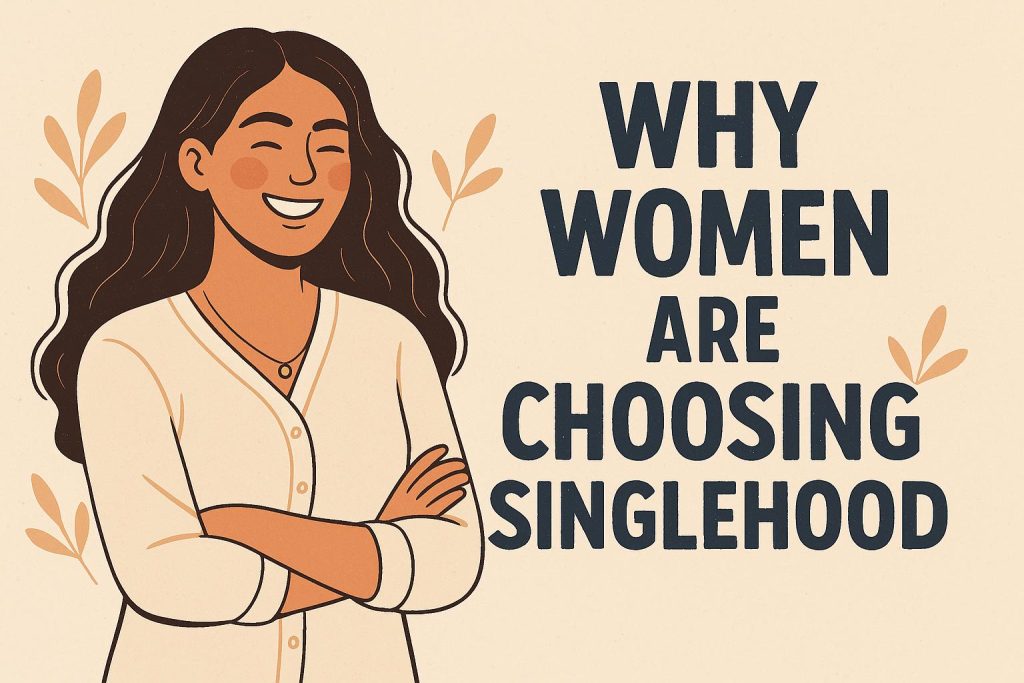In recent years, there has been a notable shift in relationship trends, with more women choosing to remain single rather than conforming to societal expectations of marriage and partnership. This phenomenon is not confined to any one region but is seen globally, driven by factors such as career aspirations, financial independence, emotional well-being, and personal freedom. As the traditional definitions of relationships evolve, women are increasingly embracing singlehood as a conscious, fulfilling choice rather than a social failure.
The Growing Trend of Singlehood Among Women
According to various studies and surveys, the number of women who remain single by choice has been steadily increasing. Reports suggest that an increasing number of women in their 20s, 30s, and even 40s are prioritizing personal growth, career development, and mental peace over romantic relationships or marriage. This shift is particularly evident in urban areas where women have greater access to education, job opportunities, and financial independence.
A 2024 Pew Research study found that over 40% of women in the United States aged 25–44 are single, compared to around 30% in the early 2000s. Similar trends have been observed in countries like Japan, South Korea, India, and many parts of Europe, where marriage rates are declining as women choose alternative lifestyles.
Key Reasons Why Women Are Choosing Singlehood
1. Financial Independence and Career Priorities
Historically, marriage was often a necessity for women due to economic dependency on men. However, modern women are increasingly self-sufficient, with careers providing them with financial security. Many women now view marriage as an option rather than a requirement for stability.
With more women pursuing higher education and excelling in their professions, they are less inclined to settle into traditional roles that might hinder their ambitions. Instead of seeking a partner to support them, they are creating their own paths to success.
2. Emotional and Mental Well-being
One of the most significant reasons why women are staying single is the pursuit of emotional and mental peace. Studies show that many women feel relationships—especially traditional marriages—come with added emotional labor, household responsibilities, and societal pressures that can be draining.
Many women who have previously been in relationships express relief after choosing singlehood, as they no longer have to deal with issues like compromising on life goals, toxic relationships, or emotional manipulation. The emphasis on self-care, therapy, and mental well-being has further strengthened this trend.
3. Freedom and Autonomy
Being single allows women to live life on their own terms. They can travel freely, make financial decisions independently, and focus on hobbies and passions without the need for compromise.
A 2023 survey conducted in the UK found that 65% of single women reported feeling “liberated” and “in control of their lives” compared to only 45% of married women. The ability to structure life without having to accommodate a partner’s needs is a powerful factor in the decision to remain single.
4. Changing Perceptions of Marriage and Relationships
The institution of marriage has evolved, and many women now question whether it aligns with their personal values and goals. Marriage is no longer seen as the ultimate marker of success, and alternative lifestyles such as long-term dating, cohabitation, or remaining single have gained wider social acceptance.
Additionally, many women feel disillusioned with traditional relationships due to rising divorce rates, gender inequality within marriages, and the emotional burdens often placed on women. As a result, they are redefining what happiness means outside the conventional framework of marriage.
5. Avoiding Societal and Family Pressures
In many cultures, women face immense pressure to marry by a certain age. However, younger generations are increasingly rejecting this pressure in favor of personal happiness. The rise of social media and women-centric empowerment movements has given more women the confidence to challenge outdated societal norms.
In countries like India, where arranged marriages are common, urban women are delaying marriage or rejecting it altogether. They prefer to focus on personal development rather than conforming to family expectations.
Challenges of Choosing Singlehood
While singlehood offers many benefits, it is not without challenges. Many single women still face social stigma, loneliness, and pressure from family or peers to “settle down.” Additionally, in some cultures, financial and legal systems still favor married couples, making it harder for single women to access benefits such as housing loans or tax breaks.
Another challenge is the lack of representation in mainstream media. While there has been some progress, much of society still glorifies marriage and romantic relationships as the ultimate goal, making it difficult for single women to feel fully validated in their choices.
The rise of singlehood among women represents a shift toward greater autonomy, self-fulfillment, and redefined societal norms. As more women choose to remain single, society must adapt to these changing dynamics by promoting inclusivity, financial support, and representation for single individuals.
Ultimately, whether a woman chooses to marry or remain single should be a personal decision, free from societal pressure. The growing trend of singlehood is a testament to women’s increasing empowerment and their ability to shape their own destinies
By: SHE LIT TEAM

